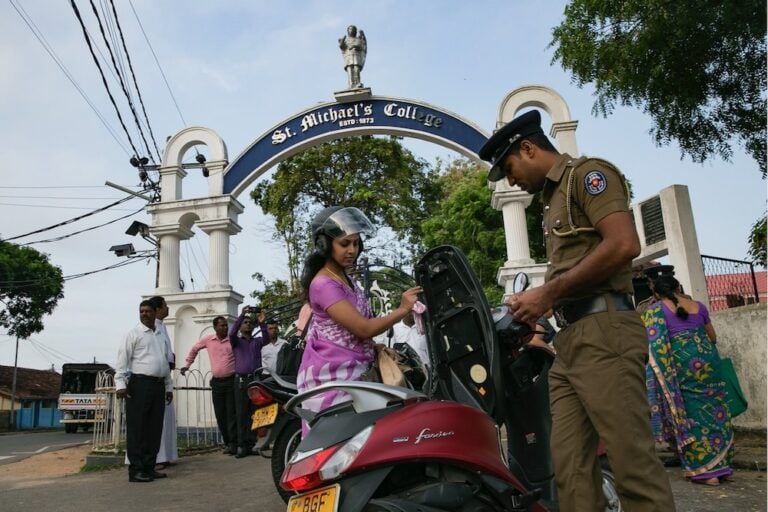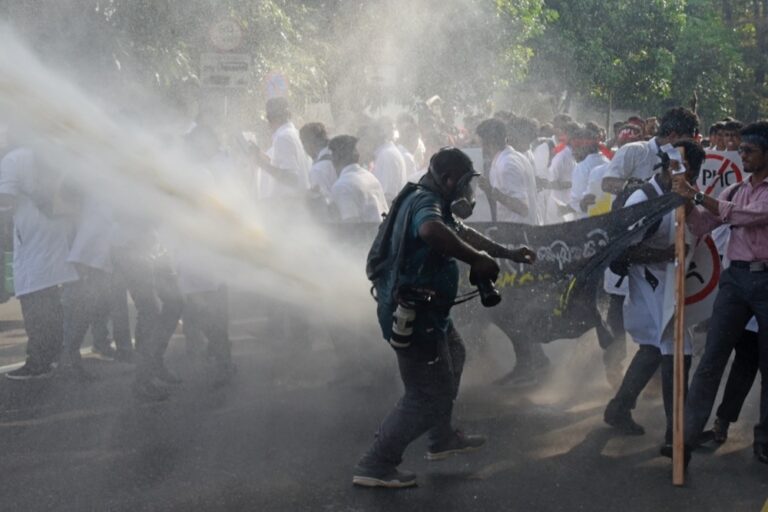(RSF/IFEX) – The following is an RSF update, followed by an open letter to Sri Lankan President Chandrika Kumaratunga regarding the murder of journalist Mylvaganam Nimalarajan: In an open letter to the Sri Lankan president, Chandrika B. Kumaratunga, RSF expressed deep concern regarding “the serious shortcomings of the police investigation and the Sri Lankan government’s […]
(RSF/IFEX) – The following is an RSF update, followed by an open letter to Sri Lankan President Chandrika Kumaratunga regarding the murder of journalist Mylvaganam Nimalarajan:
In an open letter to the Sri Lankan president, Chandrika B. Kumaratunga, RSF expressed deep concern regarding “the serious shortcomings of the police investigation and the Sri Lankan government’s apparent unwillingness to shed light” on the murder of journalist Mylvaganam Nimalarajan.
Mylvaganam Nimalarajan, contributor to the British Broadcasting Corporation (BBC) and several Sri Lankan media, was murdered on 19 October 2000 at his home in Jaffna (north of the country). Unidentified men shot at the room in which he was working and threw a grenade into it. Jaffna police have not yet given any information to the judge in charge of the case.
RSF asked the president to do everything in her “power to ensure that the journalist’s death is investigated properly and to grant Justice R.T. Vicknarajah, who is in charge of the case, all the means necessary to conduct an impartial inquiry.” RSF has also said that it would be prepared to “participate in an impartial international investigation into Nimalarajan’s murder.”
“The journalist received threats from officials of the pro-government Eeelam People’s Democratic Party (EPDP), which has been accused of human rights violations in several articles and reports. The investigators must seriously look into this hypothesis,” added RSF Secretary-General Robert Ménard.
Her Excellency Chandrika Bandaranaike Kumaratunga
President of the Republic
Presidential Secretariat
Secretariat Building
Colombo 01
Sri Lanka
Paris, 19 April 2001
Your Excellency,
On 19 October 2000, journalist Mylvaganam Nimalarajan was assassinated in his Jaffna home. The following day, you ordered the Ministry of Defence to open an inquiry into the killing. Reporters sans frontières deplores the fact that six months after Nimalarajan’s murder, the investigation has been stalled. Indeed, the 4 April deadline, recently set by a Jaffna judge for the police to submit the report of the inquiry, was delayed to 29 May, more than 7 months after the journalist’s death. As a press freedom organisation, we wish to express our deepest concern at the serious shortcomings of the police investigation and the Sri Lankan government’s apparent unwillingness to shed light on the case.
Mayilvaganam Nimalarajan, 38, was one of the rare independent journalists to inform both the local and international media on war and political developments in Jaffna, despite the censorship imposed by the current emergency legislation. The journalist worked freelance for a number of Sri Lankan media, including the Tamil-language newspapers Haraya, Athavan and Virakesari, the Sinhala-language weekly Ravaya and the independent radio station Sooriyan FM, and was a regular contributor to the BBC’s Sinhala and Tamil services. He was also the Secretary of the Northern Journalists’ Association and had been active in defending press freedom in Jaffna. His death triggered local and international outrage among journalists, civil society and the public at large.
According to our information, Nimalarajan was assassinated in his home on 19 October just after the beginning of the evening curfew. Unidentified men shot at the room in which he was working, knifed his father and threw a grenade in his lounge, further injuring his mother and 11 year old nephew. Thankfully, his wife and three young children were in different room and escaped unharmed. Nimalarajan was taken to Jaffna hospital, where he was pronounced dead at 10:30 p.m.
We wish to bring to your attention a number of leads that seem to have been ignored by the investigating officers:
First and foremost, the killing of Nimalarajan took place less than ten days after the 10 October parliamentary elections. Nimalarajan had exposed in his articles the intimidation, violence and fraud which marred the Jaffna District during the election campaign and on election day. In most of the articles which RSF has been able to consult, the journalist had implicated the pro-governmental party Eelam People’s Democratic Party (EPDP), which we understand exercises considerable official and unofficial control in the area. It is noteworthy that the journalist was killed on the very evening of the appointment of the EPDP leader as Minister for Northern Rehabilitation, Reconstruction and Tamil Affairs. A number of organisations and individuals have confirmed that the EPDP had engaged in violence and abuse of government funds during the election campaign.
A few days before his death, Nimalarajan had informed friends that he had received death threats as a consequence of his work, in particular following an article published in Athavan which implicated the EPDP.
A bicycle belonging to the EPDP was found next to Nimalarajan’s home in the aftermath of the murder. According to the BBC, Mr Kandasamy Jegadeeshwaran stated, in a letter addressed to the authorities, that he had handed over the bicycle to the EPDP office in Jaffna on 20 January 2000. We understand that anyone wishing to use a vehicle belonging to a political party must sign a register. The EPDP register might thus bear the name of the person who used the bicycle on the night of 19 October 2000.
Reporters sans frontières is all the more concerned as it appears that the police has not yet interrogated the military personnel in charge of ensuring the security of the area in which Nimalarajan lived. Indeed, we understand that the journalist’s home was located in a high security zone, a few yards away from a checkpoint, and that at least a further three checkpoints were in the near vicinity. It is difficult to believe that the soldiers who manned the checkpoints on the night of the killing failed to see and hear the attack especially considering the attackers fired in the air as they fled.
Reporters sans frontières is also worried by statements made by government officials which lay the blame for Nimalarajan’s killing on the LTTE and attempt to lessen the seriousness of his murder. In November 2000, a minister and leader of the EPDP, Douglas Devananda, stated that Nimalarajan had links to the LTTE – an accusation which, according to our sources, was reiterated by an Army official, who stated that the journalist had sent pictures of Jaffna parliamentary election candidates to the Tamil Tigers.
Reporters sans frontières notes with alarm the increasing difficulties encountered by Sri Lankan journalists, especially those of Tamil ethnic origin, in exercising their profession. Media workers have been threatened, interrogated, detained and attacked. The Jaffna newspaper Uthayan, for instance, has been the subject of a campaign of harassment for many years and we understand that its editor was the target of an attempted murder, allegedly at the hands of the EPDP, only a few weeks before Nimalarajan’s assassination.
As you are no doubt aware, Sri Lankan journalists pay a high price for exercising their legitimate right to inform the people. At least 31 of them have been killed or murdered since 1988. In almost none of these cases have the murderers been arrested and brought to a Court of Law.
Today, exactly six months after Mylvaganam Nimalarajan’s murder, we urge you to do everything in your power to ensure that the journalist’s death is investigated properly and to grant Justice R. T. Vicknarajah, who is in charge of the case, all the means necessary to conduct an impartial inquiry. We further respectfully ask you to inform us of developments in the inquiry. Reporters sans frontières would be prepared to participate in an impartial international investigation of Nimalarajan’s murder.
We thank you for your attention and eagerly await concrete signs from the Sri Lankan authorities that this brave journalist’s assassination will not remain unpunished.
Yours sincerely,
Robert Ménard
General Secretary
Cc : Sri Lankan and international press agencies and media.
Recommended Action
Similar appeals can be sent to:Her Excellency Chandrika Bandaranaike Kumaratunga
President of the Republic
Presidential Secretariat
Secretariat Building
Colombo 01
Sri Lanka
Fax: +94 1 333 703Please copy appeals to the source if possible.


